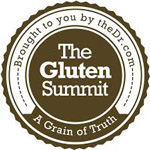|
|
|
Up to now in her series reports, Micki Rose has focused on the generalists: the people with the overall view of gluten related disorders. Now, she starts to look at the field specialists: the neurologists, paediatricians, immunologists and gastroenterologists at the clinical sharp end who, hearteningly, agreed in approach much of the time. First up: Dr Rodney Ford, gastroenterologist, paediatrician, gluten specialist; Dr David Perlmutter, neurologist, research scientist and Dr Daniel Amen, psychiatrist, brain imaging scientist. |
|
Dr Rodney Ford, gastroenterologist, paediatrician, gluten specialist Ford was the first gastroenterologist to really talk about non-coeliac gluten sensitivity (NCGS). He describes gluten illness as a stealth disease that takes a huge toll on the body, has severe effects and could be avoided if we just took gluten out of our diets early enough. He says we can no longer play ‘gluten roulette’ with the knowledge we now have about gluten.
Dr David Perlmutter, neurologist, research scientist Perlmutter thinks we have ‘vastly underestimated the effect gluten sensitivity is having on the human race’. He feels that gluten is probably one of the most key factors in neurological disease because of the influence it has on zonulin and leaky brain and gut barriers allowing cross-reactivity antibodies which can then cause inflammatory and autoimmune damage. Lowering Inflammation and Insulin Dr Perlmutter believes that inflammation is the true cause of much chronic illness and that insulin and blood sugar factors are becoming really key in neurological disorders too – he reminds us that Alzheimer’s is now commonly termed Diabetes Type 3. Eat a low carb, higher protein, good-fat anti-inflammatory diet to support nerves and membranes, rebuild body barriers and look especially for tTg6 in testing; do not rely on finding normal coeliac markers before you act.
Dr Daniel Amen, psychiatrist, brain imaging scientist Dr Amen is a classically-trained psychiatrist, a Fellow of the American Psychiatric Association in fact, who ‘got fed up of making people worse’ and switched focus to supporting brain function rather than using toxic drugs to suppress or change it. Still today he is pilloried and criticised for that approach. He uses SPECT (single-photon emission computerized tomography) brain scans to look at blood flow and activity primarily rather than using traditional MRI scans and is up to 80,000 scans on patients from 93 different countries so far, so has a lot of data to call upon. To read the introduction to the Gluten Summit, see here. Catch up with the mini-series 1, 2, 3, 4 and 5. And to read the conclusion see here. For more from me and on gluten related disorders generally, see my TrulyGlutenFree site. August 2014
|
If you found this article interesting, you will find many more general articles and research reports on coeliac disease here, and lots of information on the management of coeliac disease here.
You can also find articles and research reports on gluten intolerance here and articles on a wide range of other digestive conditions here.
For hundreds of gluten free foods see our freefrom food section here, and for nearly 800 gluten-free recipes see here.
And if you would like to get our FREE fortnightly e-newsletter with new products, recipes, articles and all the latest news from the allergy and freefrom world, just sign up here.









